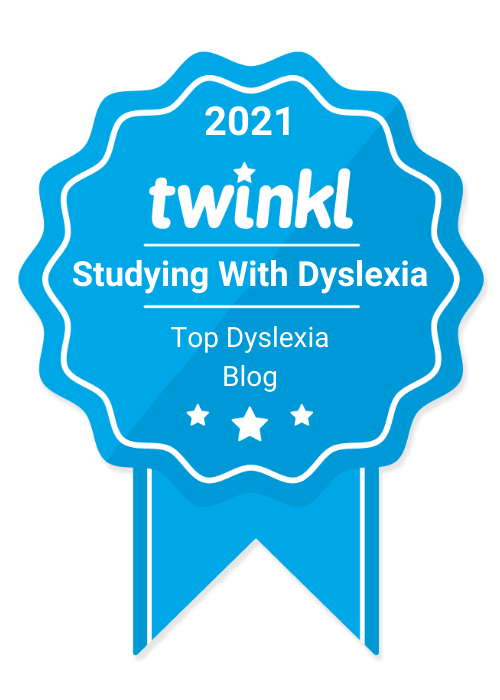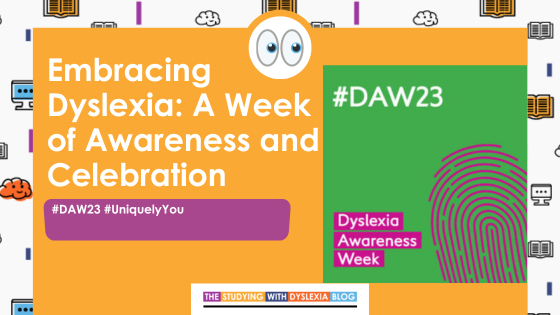Information and Inspiration
For The Supporters Of Dyslexic Learners
This Dyslexia Awareness Week, we’re joining the British Dyslexia Association’s campaign to Raise the Volume and celebrate the voices, successes, and stories of young people. At Studying with Dyslexia Blog, our mission has always been to build awareness, understanding, and community — and now we’re taking the next step. With over 3,000 followers, we’re evolving, creating new opportunities to connect, share stories, and drive lasting change together
Dyslexia and Mental Health
Dyslexia is often associated with challenges in reading, spelling, and writing, but its impact goes far beyond that. It influences how we process information, manage working memory, and perceive the world, including literacy. For many dyslexic individuals, anxiety and stress are constant companions, triggered by the demands of decoding, recalling, or engaging with tasks that feel difficult. Over time, this can take a toll on mental health, leading to frustration, burnout, and even sleep disturbances.
Understanding and embracing one's strengths, such as problem-solving, big-picture thinking, and resilience, can help manage these challenges. By focusing on their unique abilities and acknowledging difficulties, dyslexic individuals can create a supportive environment that fosters well-being and builds resilience against mental health struggles.
Keep up to date on what is going on with The Study with Dyslexia Blog
Newsletter
Signup for news and updates!
Thank you!
You have successfully joined our subscriber list.
This Dyslexia Awareness Week, we’re joining the British Dyslexia Association’s campaign to Raise the Volume and celebrate the voices, successes, and stories of young people. At Studying with Dyslexia Blog, our mission has always been to build awareness, understanding, and community — and now we’re taking the next step. With over 3,000 followers, we’re evolving, creating new opportunities to connect, share stories, and drive lasting change together
Dyslexia and Mental Health
Dyslexia is often associated with challenges in reading, spelling, and writing, but its impact goes far beyond that. It influences how we process information, manage working memory, and perceive the world, including literacy. For many dyslexic individuals, anxiety and stress are constant companions, triggered by the demands of decoding, recalling, or engaging with tasks that feel difficult. Over time, this can take a toll on mental health, leading to frustration, burnout, and even sleep disturbances.
Understanding and embracing one's strengths, such as problem-solving, big-picture thinking, and resilience, can help manage these challenges. By focusing on their unique abilities and acknowledging difficulties, dyslexic individuals can create a supportive environment that fosters well-being and builds resilience against mental health struggles.
Autistic girls often mask their differences, leading to missed diagnoses and misunderstood behaviours.
Autism impacts areas such as social interaction, communication, empathy, sensory needs, and anxiety (particularly around change). It can also influence sleep, emotions, and many other aspects of daily life.
Working with students with PDA involves recognising their unique anxiety-driven behaviours and implementing strategies that allow them to engage without feeling overwhelmed.
At Studying with Dyslexia, we believe in providing resources and creating a supportive environment for individuals with neurodivergent conditions, including dyspraxia. Understanding the challenges and needs of students with this condition is essential in offering the right strategies for success.
Understanding dyscalculia is crucial in offering the right strategies to help students thrive in an academic setting.
As we celebrate Neurodiversity Celebration Week, it's important to recognise and raise awareness about dyslexia, a specific learning difficulty that primarily affects reading, writing, and spelling.
Neurodiversity Celebration Week is an important time to reflect on the wide range of neurological differences that exist in our world. One such condition that often goes unnoticed is Fetal Alcohol Spectrum Disorder (FASD). FASD is a lifelong neurodevelopmental condition caused by exposure to alcohol in the womb.
Dyslexia is often viewed through the lens of challenges, but it’s equally important to recognise and celebrate the many strengths associated with it.
At Studying with Dyslexia, we are passionate about partnering with organisations like IDL to ensure learners get the support they need to thrive.
Dyslexia is a specific learning difference that affects language processing. It brings unique challenges but also exceptional strengths. Despite increasing awareness, myths about dyslexia still persist.
A multi-sensory approach, using a structured, cumulative learning technique, with plenty of opportunity for vital repetition, will support learners to acquire new words and build confidence.
When we teach and develop an understanding of these early numbers, it will help our pupils if we use visual images.
Stapelstein is a highly versatile and durable product designed to promote active play and support neurodiverse learners. Ideal for both children and adults, it can be used as a stool, wobble chair, stepping stone, or balance board. Its applications extend to classrooms, homes, and outdoor settings, offering benefits like improved core strength, fidget management, and sensory engagement. Stapelstein’s design, vibrant colours, and adaptability make it an excellent tool for fostering learning, creativity, and personal development in neurodiverse individuals.
Stapelstein is a highly versatile and durable product designed to promote active play and support neurodiverse learners. Ideal for both children and adults, it can be used as a stool, wobble chair, stepping stone, or balance board. Its applications extend to classrooms, homes, and outdoor settings, offering benefits like improved core strength, fidget management, and sensory engagement. Stapelstein’s design, vibrant colours, and adaptability make it an excellent tool for fostering learning, creativity, and personal development in neurodiverse individuals.
Dyslexia, primarily known as a learning difficulty affecting reading, writing, and spelling, intersects significantly with mental health. Individuals with dyslexia often experience unique challenges that can impact their emotional well-being. However, it's crucial to recognise that dyslexia also brings distinct strengths.
Dyslexia is a complex learning difference that extends far beyond struggles with reading and writing. Drawing from both personal experience and professional insight, this blog delves into key aspects of dyslexia.
I've been frequently asked about dyslexia, and as a dyslexic individual myself, I often find imt rather challenging to articulate precisely what dyslexia entails.
Reflecting on the last 24 hours on the as of 12th of January, my journey in the world of dyslexia has been quite illuminating. Throughout my career, I've been privileged to deliver training in schools and support the growth of young people in utilising assistive technology.
The Dyslexia Show is the UK's leading exhibition dedicated to dyslexia and neurodiversity. We are delighted to announce that Studying with Dyslexia is once again a key partner in raising awareness and supporting the growth of this event. Both Studying with Dyslexia and the Dyslexia Show bring together a remarkable lineup of speakers
The Dyslexia Show is the UK's leading exhibition dedicated to dyslexia and neurodiversity. We are delighted to announce that Studying with Dyslexia is once again a key partner in raising awareness and supporting the growth of this event. Both Studying with Dyslexia and the Dyslexia Show bring together a remarkable lineup of speakers
Being part of the dyslexic community has afforded me the privilege of attending some truly remarkable activities over the past few months. update on my recent activities related to dyslexia. October and November have been incredibly eventful months in the world of dyslexia. In late October, I had the pleasure of attending the Dyslexia Scotland conference
When we contemplate dyslexia, we inevitably consider the numerous challenges it poses in the realms of spelling, writing, articulation, and the simple act of transcribing thoughts onto paper. These difficulties can often lead to frustration, anxiety, discomfort, and a significant blow to one's self-esteem.
I am Arran Smith, and I am a severely dyslexic adult who has dedicated over two decades to the field of dyslexia and neurodiversity. In this blog, I want to share my personal story and my deep understanding of dyslexia and its broader impact on the neurodiverse community.
I am Arran Smith, and I am a severely dyslexic adult who has dedicated over two decades to the field of dyslexia and neurodiversity. In this blog, I want to share my personal story and my deep understanding of dyslexia and its broader impact on the neurodiverse community.
International Dysgraphia Awareness Day (IDAD), which falls on October 2nd, 2023, has a mission to broaden knowledge and understanding of dysgraphia while fostering a vibrant community
Dyslexia is an issue that continues to demand attention and improvement within the UK education system and across the globe. While we acknowledge that there's still work to be done, it's amazing to see many individuals and organisations in the UK dedicated to supporting dyslexic individuals. On September 30th, I had the distinct Honor of participating in the Bell House Dyslexia Fair, an event that exemplifies this commitment.


































This Dyslexia Awareness Week, we’re joining the British Dyslexia Association’s campaign to Raise the Volume and celebrate the voices, successes, and stories of young people. At Studying with Dyslexia Blog, our mission has always been to build awareness, understanding, and community — and now we’re taking the next step. With over 3,000 followers, we’re evolving, creating new opportunities to connect, share stories, and drive lasting change together